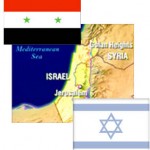Saturday
Mar062010
Israel-Syria: The War of Words Continues...
 Saturday, March 6, 2010 at 0:01
Saturday, March 6, 2010 at 0:01  Responding to Israeli Prime Minister Benjamin Netanyahu's declaration that he was prepared to meet with Syrian President Bashar Assad immediately and without preconditions, Syrian Foreign Minister Walid Moallem told the pan-Arab newspaper al-Sharq al-Awsat that Israel must first declare its intention to withdraw to the 1967 borders before any Syrian-Israeli talks can take place.
Responding to Israeli Prime Minister Benjamin Netanyahu's declaration that he was prepared to meet with Syrian President Bashar Assad immediately and without preconditions, Syrian Foreign Minister Walid Moallem told the pan-Arab newspaper al-Sharq al-Awsat that Israel must first declare its intention to withdraw to the 1967 borders before any Syrian-Israeli talks can take place.Israel-Syria Dialogues: Hopes vs. Realities
The Syrian foreign minister said that there is no point in "putting the cart before the horse" and that "Israel must withdraw from the occupied territories before Syria and Israel can meet".
Despite the exchange of threats between Damascus and West Jerusalem last month and the trilateral meeting of Hezbollah's Sheikh Hassan Nasrallah, Iran's Mahmoud Ahmadinejad, and Assad in Syria on 25 February, Israel's training exercise "Firestones 12", which took place in northern Israel last week, conspicuously omitted simulations of war with Syria. Instead, the Israel Defense Forces fought mock battles in preparation for clashes with Hezbollah in Lebanon or Hamas in the Gaza Strip. The army also cancelled emergency call-up drills for large numbers of regular forces and reserves, fearing Syria might mistake such a move as mobilization for war.
But in line with Haaretz's Gideon Levy's article "Israel Does Not Want Peace," it can be said that Israel seeks no talks to resolve the problem; instead, it suspends this possibility while never missing any chance of upholding Damascus's hostility. At the end of the day, Syria is bound to play the "bad guy" for Israeli officials, isn't it?
tagged  Al-Sharq al-Awsat,
Al-Sharq al-Awsat,  Bashar Al-Assad,
Bashar Al-Assad,  Benjamin Netanyahu,
Benjamin Netanyahu,  Firestones 12,
Firestones 12,  Gaza Strip,
Gaza Strip,  Gideon Levy,
Gideon Levy,  Ha'aretz,
Ha'aretz,  Hezbollah,
Hezbollah,  Iran,
Iran,  Israel,
Israel,  Israel Radio,
Israel Radio,  Israeli Defense Forces,
Israeli Defense Forces,  Lebanon,
Lebanon,  Mahmoud Ahmadinejad,
Mahmoud Ahmadinejad,  Middle East Security Survey Report,
Middle East Security Survey Report,  Sheikh Hassan Nasrallah,
Sheikh Hassan Nasrallah,  Syria,
Syria,  Walid al-Moallem in
Walid al-Moallem in  Middle East & Iran
Middle East & Iran
 Al-Sharq al-Awsat,
Al-Sharq al-Awsat,  Bashar Al-Assad,
Bashar Al-Assad,  Benjamin Netanyahu,
Benjamin Netanyahu,  Firestones 12,
Firestones 12,  Gaza Strip,
Gaza Strip,  Gideon Levy,
Gideon Levy,  Ha'aretz,
Ha'aretz,  Hezbollah,
Hezbollah,  Iran,
Iran,  Israel,
Israel,  Israel Radio,
Israel Radio,  Israeli Defense Forces,
Israeli Defense Forces,  Lebanon,
Lebanon,  Mahmoud Ahmadinejad,
Mahmoud Ahmadinejad,  Middle East Security Survey Report,
Middle East Security Survey Report,  Sheikh Hassan Nasrallah,
Sheikh Hassan Nasrallah,  Syria,
Syria,  Walid al-Moallem in
Walid al-Moallem in  Middle East & Iran
Middle East & Iran 
